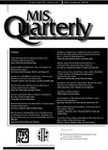-
作者:Ives, Blake; Olson, Margrethe H.
作者单位:Dartmouth College; State University of New York (SUNY) System; Binghamton University, SUNY; New York University
摘要:The role of the information systems manager has evolved in twenty years from that of a technician managing a relatively unimportant service function into that of a vice presidential-level, general manager whose department can substantially impact the entire organization. In this article we trace, by example, the historical evolution of the job, and through an observational study of six information systems managers, examine the position today. The analysis includes the daily activities of the m...
-
作者:Hamilton, Scott; Chervany, Norman L.
作者单位:University of Minnesota System; University of Minnesota Twin Cities
摘要:Evaluations of Management Information System (MIS) tend to be subjective and are influenced by the perceptions of system objectives, as well as the experiences with system performance in accomplishing organizational objectives. Consequently, the assessments of MIS effectiveness are often controversial and can be sources of disagreement and conflict between different functional groups involved in MIS implementation - users, MIS development, internal audit, and top management personnel. This art...
-
作者:Young, Lawrence F.
作者单位:Drexel University; Technion Israel Institute of Technology; DuPont; DuPont USA; Drexel University
摘要:Some underlying causes of increasing costs in the health cam field and some of their proposed remedies are examined for relevance to the practice of MIS. Conflicting values between specialists and administrators have been described and illustrated in health cam by behavior patterns called The Golden Scope Syndrome and The Availability Effect. These are seen by the author as working in similar ways in computer using organizations. Underlying organizational factors and ways to bring specialist g...
-
作者:Huber, George P.
作者单位:University of Wisconsin System; University of Wisconsin Madison
摘要:Today's Decision Support Systems (DSS) are almost invariably designed to function in rational, or rationalized, decision making environments. Many organizational environments, such as political environments or garbage can environments, are more accurately portrayed, however, with models other than the Rational Model. Can DSS be useful in such environments? What are the boundary conditions for the application of DSS? These are the questions addressed in this article.
